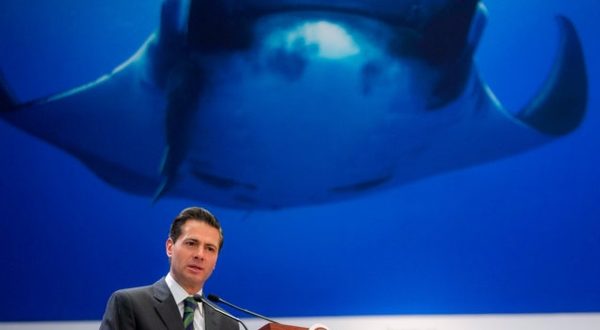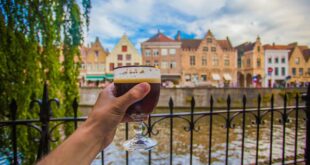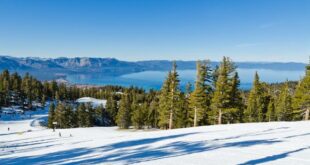[ad_1]
Count Mexico among the nations creating marine parks for the sole purpose of protecting maritime life.
On Friday, Mexico’s president Enrique Pena Nieto designated the Revillagigedo Archipelago, a set of four volcanic islands and its surrounding waters, as the nation’s newest national park.
Con el Decreto del Parque Nacional Revillagigedo, el @gobmx reafirma su compromiso con la conservación del patrimonio de @Mexico y el mundo. pic.twitter.com/RNfTruK6XM
— Enrique Peña Nieto (@EPN) November 25, 2017
The park, located approximately 250 miles south of Cabo San Lucas and 400 miles from Colima, serves as a feeding and migration areas for whales, sharks, rays and other migratory species. Encompassing more than 57,000 square miles, it is the largest marine park in North America.
According to the Pew Charitable Trust, the four islands are “the peaks of volcanoes created more than 3.5 million years ago. They are part of a larger formation of seamounts, or underwater mountains, that help create the upwelling of nutrients from the deep sea that supports a vast array of marine life.”
A Pew fact sheet calls the area a “waypoint” for many large migratory species, including at least 366 species of fish—some 26 of which can be found nowhere else in the world. It also attracts 37 species of sharks and rays, including Mexico’s popular whale sharks and one of the world’s largest populations of oceanic manta rays. Four threatened species of sea turtles—leatherback, green, olive ridley, and hawksbill have also been found there.
“The remote marine park provides a place where whales, dolphins, sharks and tuna can feed, breed, and rest during their migrations,” read the fact sheet.
Because of the site’s rich resources, it was inscribed onto the UNESCO list of World Heritage properties in 2016.
While formerly a popular site for commercial fisherman, the national park designation means that no fishing or mining will be allowed in and around the islands.
“With the goal of guaranteeing maximum protection of this World Heritage Site, our national legislation’s strongest conservation category will be used, and all forms of fishing will be prohibited,” said Alejandro Del Mazo Maza, of Mexico’s National Commission of Protected Natural Areas, said in a statement, according to National Geographic.
While the new park is also being hailed as a potential new site for ecotourism, the designation also means no major development—including hotel construction—will be allowed on the islands.
Mexico has 34 sites on UNESCO’s Natural World Heritage List, including 26 natural sites, seven cultural sites and one mixed.
“The inscription of the Revillagigedo Archipelago to this list positioned us as the [country] with the highest number of registered properties in the Latin American and Caribbean region, and the sixth worldwide,” said Vidal Franciso Soberón Sanz, Mexico’s Secretary of the Navy, which is being charged with oversight and security of the new park, according to El Universal
The new marine reserve designation is being hailed around the world, including shout-outs by National Geographic and Richard Branson.
Wonderful to hear @EPN @RafaelPacchiano are making #ocean history by declaring the Revillagigedo Archipelago Mexico’s first fully protected marine reserve. Wholehearted congratulations, look forward to celebrating with you
— Richard Branson (@richardbranson) November 20, 2017
Hoy el presidente de México, Enrique Peña Nieto, firmó el decreto que crea el Parque Nacional Revillagigedo. pic.twitter.com/ohwQDBETg1
— National Geographic (@NatGeo_la) November 24, 2017
In an interview with the Huffington Post, Matt Rand, director of the Pew Bertarelli Ocean Legacy Project, congratulated Mexico’s government on the new designation.
“It wasn’t an easy decision because they had significant opposition from the commercial fishing industry, which I think is unfortunate,” he said. “I would love to see a commercial industry embrace this notion that certain areas should be protected.”
He also called the reserve “biologically spectacular.”
[ad_2]You can read more of the news on source
 Travelsmart
Travelsmart



